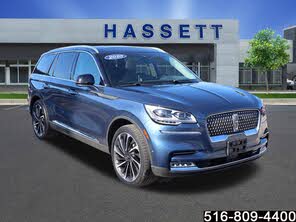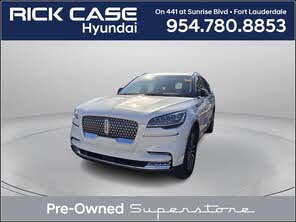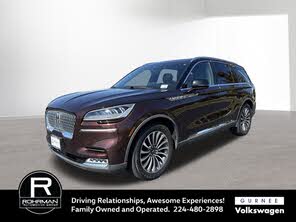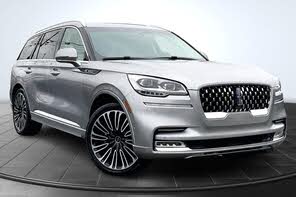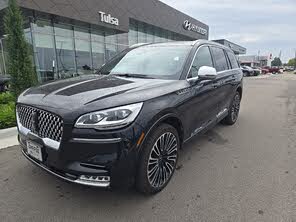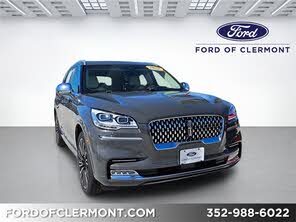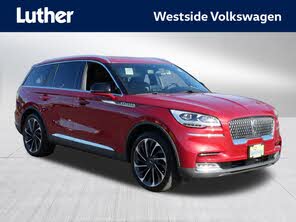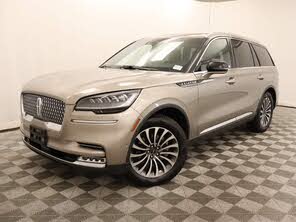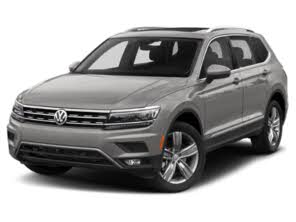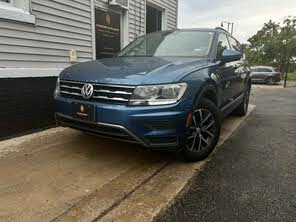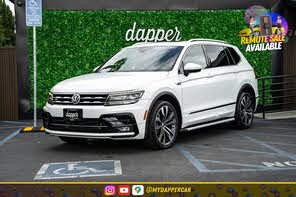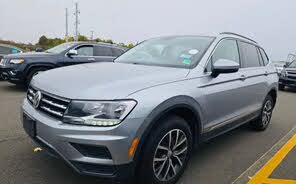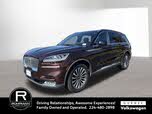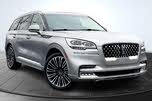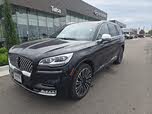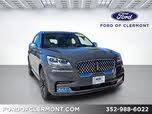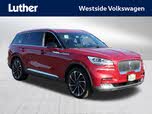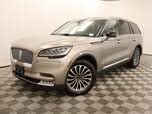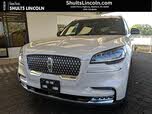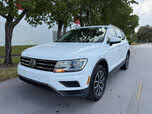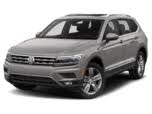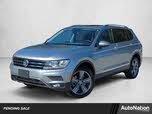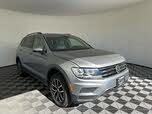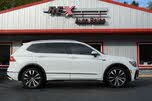2020 Lincoln Aviator vs 2020 Volkswagen Tiguan
Overview | |
MSRP$51,100 | MSRP$24,945 |
Listings596 | Listings914 |
Ratings & Reviews | |
User Reviews | User Reviews |
Expert reviews8.2 out of 10 | Expert reviews7.7 out of 10 |
Pros
Cons
| Pros
Cons
|
2020 Lincoln Aviator Reviews SummaryThe heyday for Lincoln was more than a half-century ago. Those postwar years of prosperity and optimism were the perfect time for cars like the Continental and others. They delivered comfort and luxury, wrapped in midcentury modern styling. Even as recently as the 1990s, Lincoln was still a popular brand, riding the SUV craze with its Navigator. But after the turn of the century, Lincoln lost its ability to create new designs and looked inward and backward. Sure, retro-themed cars like the redesigned Mustang, PT Cruiser, and Chevy HHR had turned some heads, but none of those came from luxury brands. The BMWs and Mercedes of the world were all looking forward and pushing the envelope for contemporary automotive design. Meanwhile, Lincoln offered the MKX, which was based on the Ford Edge and featured ’66 Continental styling. Neat in a vacuum, but off-base compared to the modern luxury market. This experimental phase with various retro looks coincided with the move to the MK-# alphabet-soup naming convention and big improvements in the Ford lineup, where top-end trims of the Fusion overlapped with an entry-level trim of the MKZ. The combination left Lincoln a confusing, anonymous afterthought in the modern luxury game. But Lincoln is finally ready to change all that. It has a new cohesive design language, its focus is once again on luxury, and the three-letter naming convention that never meant anything to anyone other than Lincoln marketers is gone. The brand led with the 2017 Continental and 2018 Navigator, which are each impressive in their own right. But the company's lineup is growing and now includes the all-new 2020 Lincoln Aviator. Named after a luxury variant of the 2002-2005 Ford Explorer, this new Aviator is also based on the contemporary Explorer platform, but it's a luxury vehicle in its own right. Much of the success of the Lincoln brand may hinge on this midsize, 3-row luxury SUV, so you need to consider its competition, such as the Audi Q7, Infiniti QX60, and all-new Cadillac XT6. Read on to learn if Lincoln’s take on luxury will stand out in a crowded competitive field. | |
2020 Volkswagen Tiguan Reviews SummaryThe Volkswagen Tiguan is one of only two compact crossover SUV’s that currently offer third-row seating. (And the other is the hopelessly outdated Mitsubishi Outlander.) To fit the extra pair of surprisingly spacious seats, VW made the Tiguan much larger than average for its competitive set—which suits a vehicle that fills big shoes in VW dealerships. With five trim levels and prices that stretch from just under $26,000 to a bit over $40,000, the Tiguan is the German brand’s best-selling vehicle in the U.S. | |
No video found | |
Popular Features & Specs | |
Engine3.0L 400 hp V6 | Engine2.0L 184 hp I4 |
Drive TrainRWD | Drive TrainFWD |
Seating Capacity7 | Seating Capacity7 |
Horsepower | Horsepower184 hp @ 4400 rpm |
MPG City18 | MPG City22 |
MPG Highway26 | MPG Highway29 |
Engine | |
Engine Name3.0L 400 hp V6 | Engine Name2.0L 184 hp I4 |
Torque | Torque221 lb-ft @ 1600 rpm |
Horsepower | Horsepower184 hp @ 4400 rpm |
DrivetrainRWD | DrivetrainFWD |
Fuel Economy | |
MPG City18 | MPG City22 |
MPG Highway26 | MPG Highway29 |
Interior | |
Seating Capacity7 | Seating Capacity7 |
Safety | |
Front Crash Overall5 | Front Crash Overall4 |
Side Crash Overall5 | Side Crash Overall5 |
Dimensions & Capacity | |
Cargo Space18.3 cu ft | Cargo Space12.0 cu ft |
Curb Weight4764 lbs | Curb Weight3757 lbs |
Height69.8 in | Height66.3 in |
Length199.3 in | Length185.1 in |
Width89.9 in | Width72.4 in |
Wheelbase119.1 in | Wheelbase109.8 in |
Maximum Payload | Maximum Payload1124 lbs |
Number of doors4 | Number of doors4 |
Maximum Towing Capacity | Maximum Towing Capacity1500 lbs |
Overview | ||
MSRP | $51,100 | $24,945 |
Listings | ||
Ratings & Reviews | ||
User reviews | ||
Expert reviews | 8.2 out of 10Read full review | 7.7 out of 10Read full review |
Pros & cons | Pros
Cons
| Pros
Cons
|
Summary | The heyday for Lincoln was more than a half-century ago. Those postwar years of prosperity and optimism were the perfect time for cars like the Continental and others. They delivered comfort and luxury, wrapped in midcentury modern styling. Even as recently as the 1990s, Lincoln was still a popular brand, riding the SUV craze with its Navigator. But after the turn of the century, Lincoln lost its ability to create new designs and looked inward and backward. Sure, retro-themed cars like the redesigned Mustang, PT Cruiser, and Chevy HHR had turned some heads, but none of those came from luxury brands. The BMWs and Mercedes of the world were all looking forward and pushing the envelope for contemporary automotive design. Meanwhile, Lincoln offered the MKX, which was based on the Ford Edge and featured ’66 Continental styling. Neat in a vacuum, but off-base compared to the modern luxury market. This experimental phase with various retro looks coincided with the move to the MK-# alphabet-soup naming convention and big improvements in the Ford lineup, where top-end trims of the Fusion overlapped with an entry-level trim of the MKZ. The combination left Lincoln a confusing, anonymous afterthought in the modern luxury game. But Lincoln is finally ready to change all that. It has a new cohesive design language, its focus is once again on luxury, and the three-letter naming convention that never meant anything to anyone other than Lincoln marketers is gone. The brand led with the 2017 Continental and 2018 Navigator, which are each impressive in their own right. But the company's lineup is growing and now includes the all-new 2020 Lincoln Aviator. Named after a luxury variant of the 2002-2005 Ford Explorer, this new Aviator is also based on the contemporary Explorer platform, but it's a luxury vehicle in its own right. Much of the success of the Lincoln brand may hinge on this midsize, 3-row luxury SUV, so you need to consider its competition, such as the Audi Q7, Infiniti QX60, and all-new Cadillac XT6. Read on to learn if Lincoln’s take on luxury will stand out in a crowded competitive field. | The Volkswagen Tiguan is one of only two compact crossover SUV’s that currently offer third-row seating. (And the other is the hopelessly outdated Mitsubishi Outlander.) To fit the extra pair of surprisingly spacious seats, VW made the Tiguan much larger than average for its competitive set—which suits a vehicle that fills big shoes in VW dealerships. With five trim levels and prices that stretch from just under $26,000 to a bit over $40,000, the Tiguan is the German brand’s best-selling vehicle in the U.S. |
Video | No video found | |
Popular Features & Specs | ||
Engine | 3.0L 400 hp V6 | 2.0L 184 hp I4 |
Drive Train | RWD | FWD |
Seating Capacity | 7 | 7 |
Horsepower | 184 hp @ 4400 rpm | |
MPG City | 18 | 22 |
MPG Highway | 26 | 29 |
Engine | ||
Engine Name | 3.0L 400 hp V6 | 2.0L 184 hp I4 |
Torque | 221 lb-ft @ 1600 rpm | |
Horsepower | 184 hp @ 4400 rpm | |
Drivetrain | RWD | FWD |
Fuel Economy | ||
MPG City | 18 | 22 |
MPG Highway | 26 | 29 |
Interior | ||
Seating Capacity | 7 | 7 |
Safety | ||
Front Crash Overall | 5 | 4 |
Side Crash Overall | 5 | 5 |
Dimensions & Capacity | ||
Cargo Space | 18.3 cu ft | 12.0 cu ft |
Curb Weight | 4764 lbs | 3757 lbs |
Height | 69.8 in | 66.3 in |
Length | 199.3 in | 185.1 in |
Width | 89.9 in | 72.4 in |
Wheelbase | 119.1 in | 109.8 in |
Maximum Payload | 1124 lbs | |
Number of doors | 4 | 4 |
Maximum Towing Capacity | 1500 lbs | |
The 2020 Lincoln Aviator was positioned between the larger Navigator and the smaller MKC, which was later replaced by the Corsair. Lincoln's return to using real vehicle names was a positive shift, moving away from the previous alphabet-soup naming convention. The Aviator featured a unified design language across Lincoln's lineup, with elegant headlights and a prominent chrome grille. Its tapered roofline and low, wide beltline gave it a sleek, elongated appearance, reminiscent of a luxury yacht. Inside, the Aviator's cabin boasted a flowing design with soft-touch materials and selective brightwork, exuding a sense of understated luxury. The seats were both elegant and sturdy, with a piano-key design for the shifter buttons, hinting at a Golden Age of luxury without overwhelming the overall design. The Aviator's interior was plush, with leather extending to areas where it wasn't strictly necessary, showcasing Lincoln's commitment to luxury. Unique touches like a panoramic moonroof and orchestral warning jingles recorded by the Detroit Symphony Orchestra highlighted Lincoln's holistic approach to luxury.
The 2020 Volkswagen Tiguan, redesigned in 2018, addressed its predecessor's size and pricing issues, aligning more closely with competitors like the Honda CR-V and Toyota RAV4. The Tiguan's styling was quintessentially Volkswagen, with clean lines and a horizontal grille connecting the headlights. While the exterior was conservatively stylish, the interior was less impressive, with dull surfaces and hard plastics. The cockpit was simple, bordering on boring, as VW seemed to prioritize electronics over interior design. The infotainment system, however, was a highlight, with an optional digital dashboard and a glass-covered touchscreen that was responsive and visually appealing. Despite the interior's shortcomings, the Tiguan's practicality and size made it a strong contender in the compact crossover segment.











The 2020 Lincoln Aviator came standard with a robust twin-turbocharged 3.0-liter V6 engine, producing 400 horsepower and 415 pound-feet of torque. This engine was part of the same family used in the Ford Explorer, Expedition, and F-150. The Grand Touring trim elevated performance by combining the V6 with a 100-hp electric motor, resulting in a total output of 494 hp and 630 lb-ft of torque. Both powertrains utilized a 10-speed automatic transmission, with the base V6 offering rear-wheel drive or all-wheel drive, while the plug-in hybrid was exclusively all-wheel drive. The Aviator's acceleration was impressive, achieving 0-60 mph in about 4 seconds, regardless of the powertrain. The hybrid setup provided smooth, confident acceleration and improved fuel efficiency, with a combined 23 mpg and a 21-mile electric-only range. The Aviator's driving experience was characterized by light steering and cushioned brakes, offering a refined ride reminiscent of luxury SUVs like the Rolls-Royce Cullinan. The Aviator's Excite drive mode added a touch of dynamism, but its 5,600-pound weight limited its agility. Fuel economy for the conventional Aviator was 18 mpg city, 26 highway, and 21 combined for RWD, and slightly lower for AWD.
The 2020 Volkswagen Tiguan was powered by a turbocharged 2.0-liter four-cylinder engine, delivering 184 horsepower and 221 pound-feet of torque. This engine was paired with an eight-speed automatic transmission, available in front-wheel drive or all-wheel drive for an additional $1,300. The Tiguan's powertrain prioritized torque, providing snappy throttle response and minimal turbo lag. However, its performance was moderate, with the transmission downshifting smoothly but requiring patience for highway passing when fully loaded. The Tiguan's engine was relatively quiet, with a refined sound at high revs, and the cabin was well-insulated from wind noise. The Tiguan's larger size impacted its handling, with a longer wheelbase that reduced nimbleness. The suspension was soft, ensuring a comfortable ride even on rough roads. The Tiguan's sport mode firmed up the steering slightly, but the normal setting remained too light. While not the most fun-to-drive compact crossover, the Tiguan offered a balance of size and comfort, appealing to those seeking practicality over sportiness.
The 2020 Lincoln Aviator, with its three-row seating, competed with luxury SUVs like the Audi Q7 and Mercedes-Benz GLE. The optional second-row captain's chairs were highly praised, while the power-closing third row was adequate for adults but better suited for children on longer trips. With the second and third rows folded, the Aviator offered 77 cubic feet of cargo space, comparable to the Cadillac XT6. The Aviator's interior featured some unconventional controls, such as the door handles and seat adjustments, which could be confusing. The 30-way seats with massage function required navigating a touchscreen menu, adding complexity. The door-release function was also unconventional, with a button instead of a traditional handle, raising concerns about usability in emergencies.
The 2020 Volkswagen Tiguan excelled in practicality, with a second row that could slide up to seven inches, making the third row more usable. While the third row wasn't spacious, it offered enough legroom for shorter adults and children. Front-drive Tiguans came standard with the third row, while AWD models offered it as a $595 option. The third row's low cushion position was a drawback, but it was roomier than many larger vehicles. The second-row seats folded flat, providing 65.7 cubic feet of cargo space with the third row collapsed, and 73.5 cubic feet in two-row models. The Tiguan's interior felt roomy, with ample hip and shoulder room in the front seats. The abundant glass and seating position enhanced the sense of space, appealing to those downsizing from larger SUVs.
The 2020 Lincoln Aviator featured the Sync 3 infotainment system with a 10.1-inch touchscreen in a landscape layout, offering a user-friendly interface for Apple CarPlay and Android Auto. The fully digital instrument panel and head-up display provided essential information in a minimalist manner, enhancing the driving experience.
The 2020 Volkswagen Tiguan's infotainment system, MIB II, was set to be replaced by MIB3 in the following year. Despite this, the current system was highly regarded, with an 8-inch capacitive touchscreen in SE and higher trims offering bright colors and responsive performance. The Tiguan S had a single USB-C port, while higher trims featured USB-A ports and a wireless charging pad. VW's Digital Cockpit, available on top SEL trims, allowed for customization and reconfiguration, complementing standard Apple CarPlay and Android Auto interfaces.
The 2020 Lincoln Aviator came equipped with a comprehensive suite of safety features, including front and side-impact airbags, traction control, and a tire pressure monitoring system. The Lincoln Co-Pilot360 suite offered advanced driver-assistance systems such as forward-collision avoidance, lane-departure warning, adaptive cruise control, and automatic high beams. Additional safety tech included blind-spot monitoring and a head-up display.
The 2020 Volkswagen Tiguan improved its standard safety package with features like forward-collision warning, automatic emergency braking, blind spot monitoring, and rear cross-traffic alert. However, adaptive cruise control and lane-keeping assistance were reserved for the top SEL trim. VW's Car-Net telematics package connected the vehicle to an owner's smartphone, offering remote locking, status checks, and vehicle location. The Tiguan was rated a Top Safety Pick by the IIHS for SEL Premium models with LED headlights, while most models with halogen headlights received a poor rating.
CarGurus highlights
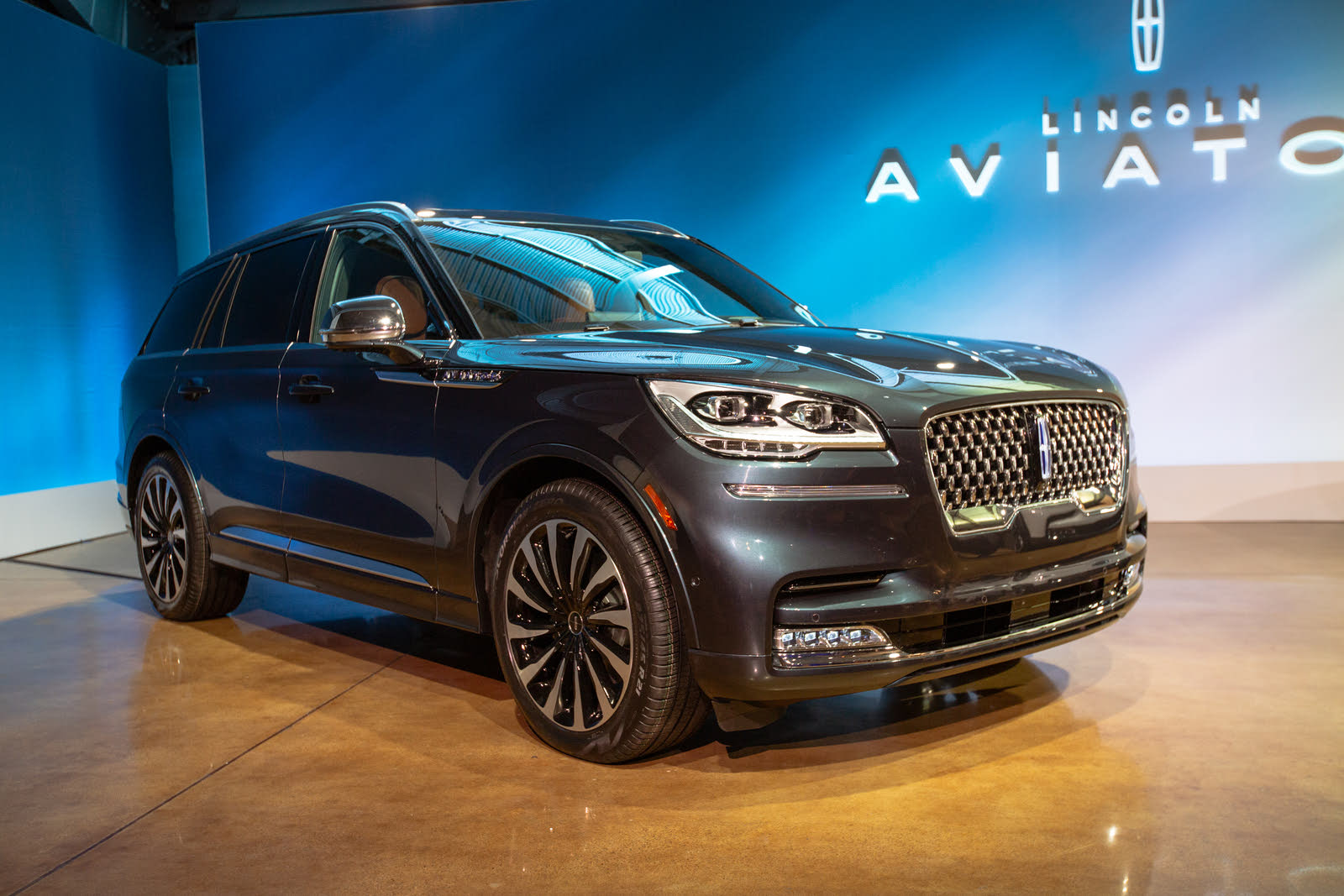
According to CarGurus experts, the overall rating for the 2020 Lincoln Aviator is 8.2 out of 10, while the 2020 Volkswagen Tiguan scores 7.7 out of 10. Based on these ratings, the Lincoln Aviator is the recommended choice for those seeking a luxurious and powerful SUV with advanced features and a refined driving experience.
Choose the 2020 Lincoln Aviator if:
- You prioritize luxury and comfort with a plush interior and advanced features.
- You desire a powerful engine with impressive acceleration and a hybrid option.
- You value a comprehensive suite of safety and driver-assistance technologies.
Choose the 2020 Volkswagen Tiguan if:
- You need a practical and spacious compact crossover with flexible seating options.
- You appreciate a user-friendly infotainment system with advanced digital displays.
- You seek a well-rounded safety package with connectivity features for added convenience.
CarGurus highlights

According to CarGurus experts, the overall rating for the 2020 Lincoln Aviator is 8.2 out of 10, while the 2020 Volkswagen Tiguan scores 7.7 out of 10. Based on these ratings, the Lincoln Aviator is the recommended choice for those seeking a luxurious and powerful SUV with advanced features and a refined driving experience.
Choose the 2020 Lincoln Aviator if:
Shop Now- You prioritize luxury and comfort with a plush interior and advanced features.
- You desire a powerful engine with impressive acceleration and a hybrid option.
- You value a comprehensive suite of safety and driver-assistance technologies.
Choose the 2020 Volkswagen Tiguan if:
Shop Now- You need a practical and spacious compact crossover with flexible seating options.
- You appreciate a user-friendly infotainment system with advanced digital displays.
- You seek a well-rounded safety package with connectivity features for added convenience.

By: CarGurus + AI
At CarGurus, our team of experienced automotive writers remain at the heart of our content operation, conducting hands-on car tests and writing insightful guides that are backed by years of industry experience. To complement this, we are harnessing AI to make our content offering more diverse and more helpful to shoppers than ever. To achieve this, our AI systems are based exclusively on CarGurus content, ratings and data, so that what we produce is both unique to CarGurus, and uniquely helpful to car shoppers.


